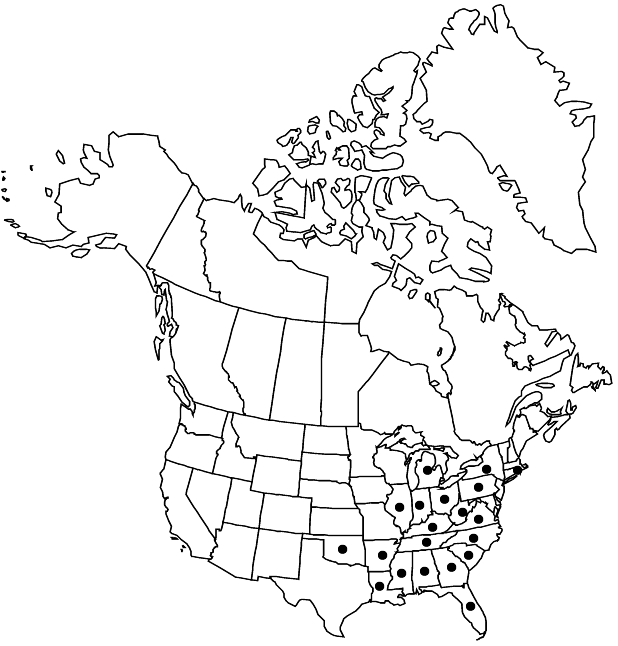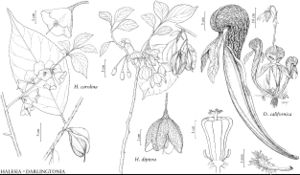Halesia carolina
Syst. Nat. ed. 10, 2: 1044, 1369. 1759 ,.
Shrubs or trees to 24 m. Leaves: petiole 11–29 mm; blade whitish green or grayish green abaxially, ovate-oblong, elliptic, or obovate to oblanceolate, 8.7–22.5 × 3.8–11.4 cm, length 1.5–3.3 times width, margins 25–80-toothed, abaxial surface not shiny, quaternary veins not raised abaxially. Inflorescences appearing fasciculate, 2–6-flowered, sometimes solitary flowers, ebracteolate. Flowers: sepals 2–5 × 1.5–3 mm; corolla open prior to anthesis, 10–29 mm, glabrous, tube 7–26 mm, lobes 3–7 × 5–12 mm; stamens 12–16, 9–17 mm; filaments adnate to corolla 2–3 mm, free portion connate 1–3 mm, distinct portion 5–14 mm, glabrous abaxially, hairy adaxially; anthers 2.5–4 mm; style glabrous. Fruits ± equally 4-winged, ellipsoid to clavate, 2.4–5 × 0.7–2.6 cm. 2n = 24.
Phenology: Flowering Mar–May; fruiting Jun–Nov.
Habitat: Moist, often slightly acidic and sandy soils, wooded floodplains, stream banks, borders of swamps, hammocks, roadsides
Elevation: 0-1600 m
Distribution

Ala., Ark., Fla., Ga., Ill., Ind., Ky., La., Mich., Miss., N.Y., N.C., Ohio, Okla., Pa., R.I., S.C., Tenn., Va., W.Va.
Discussion
Two poorly defined taxa have been segregated from Halesia carolina at the species level or below. The mountain entity, H. monticola, is a tree to 20 meters or more with relatively large flowers, deeply included stamens, and relatively large fruits. The more often recognized coastal-plain entity H. parviflora is a shrub with smaller flowers, exserted stamens, and clavate fruits. P. W. Fritsch and S. A. Lucas (2000) have demonstrated that the characters used to delimit segregates vary either irregularly or more or less continuously with latitude.
Halesia carolina is not native in Michigan, New York, Pennsylvania, and Rhode Island but has been locally naturalized in these states.
